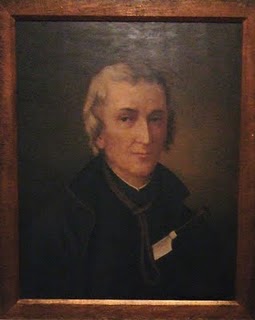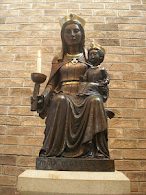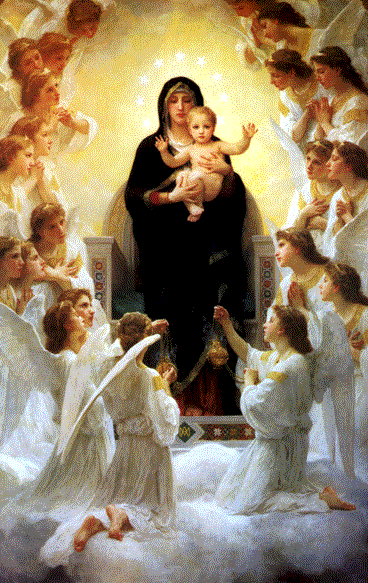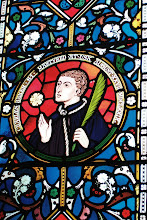Brecon has a proud history of loyalty to the 'Old Faith'. Families such as Powell and Lloyd have contributed much to the preservation of the Faith in that area and, as priests, shed their blood as Martyrs. One such priest was Philip Powell.
 |
| Blessed Philip Powell, O S B |
 | |
| Dom Augustine Baker, O S B (Photo by J D Smith) |
On 7th March 1622, Fr Powell was sent on the English Mission. For sixteen months he lived with Dom Augustine in Gray's Inn Lane, London. In an attempt to elude the priest hunters, it was customary for priests working covertly on the English Mission to assume an alias. Thus, Fr Philip Powell was also known as Philip Morgan or Philip Prosser. For about twenty years Fr Powell worked in the areas of Cornwall, Devon and Somerset. When Civil War erupted, the priest went to Cornwall and served as Chaplain to the Catholic soldiers in General Goring's army.
After Goring's force disbanded, Fr Powell took ship for South Wales in an attempt to reach Monmouthshire. Unfortunately, the ship was captured off Mumbles and on 22nd February 1646 Philip Powell was arrested by Captain Crowther. Crowther kept him confined in the ship until 11 may when he sent him to London to be imprisoned in St Catherine's Gaol, Southwark.
Due to the terrible conditions and harsh treatment, Fr Powell became severely ill with Pleurisy. His trial had been fixed for 30th May but it did not take place until 9th June. He was tried in Westminster Hall, where he brilliantly defended himself. Predictably, he was found guilty of being a priest and condemned to death. When the sentence of death was pronounced, Fr Powell exclaimed, "Oh what am I that God thus honours me and will have me to die for his sake?"
On 30th June 1646, the sentence was carried out and Fr Philip Powell was hanged, drawn and quartered at Tyburn. He was 52 years old. He met his death with unshaken faith in the God he had so long served and therefore, with joy. He is recorded as saying, "This is the happiest day and the greatest joy that ever befell me, for I am brought hither for no other cause or reason than that I am a Roman Catholic priest and a monk of the Order of St Benedict." His remains were buried in the old churchyard at Moorfields, London. A crucifix of his and some other relics are in the possession of Downside Abbey, Bath.
On 8th December 1929, Fr Philip Powell was Venerated when Pope Pius XI issued a decree of Martyrdom. A week later, 15th December 1929, another steadfast son of Wales, Fr Philip Powell, was Beatified by Pope Pius XI.
On 8th December 1929, Fr Philip Powell was Venerated when Pope Pius XI issued a decree of Martyrdom. A week later, 15th December 1929, another steadfast son of Wales, Fr Philip Powell, was Beatified by Pope Pius XI.
Blessed Philip Powell, pray for us.










.JPG)

.JPG)



.JPG)
